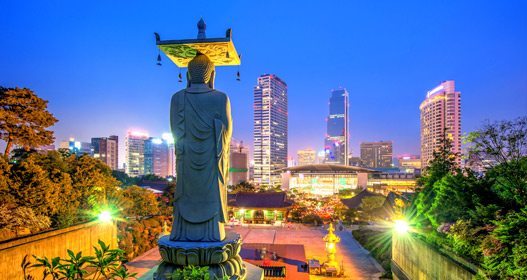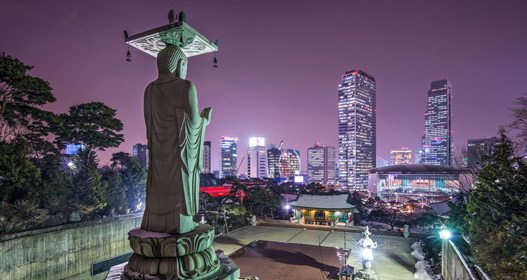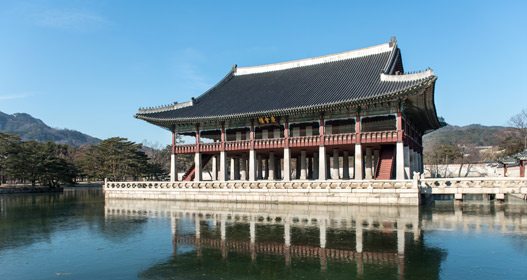Teach English in or near: Seoul, Busan, Daegu, Daejeon, Gwangju, Incheon, Ulsan, Sejong
South Korea is a small, very modern and high-tech country located across the South China Sea from Japan, and is one of the best places to teach English in East Asia thanks to superb natural attractions and excellent teaching salaries and packages.
South Korea is also known for beautiful mountain ranges that invite hiking in summer and skiing in winter, cherry orchards, Buddhist temples, beautiful beaches and islands and a unique chilli-based cuisine.
The many cities in South Korean offer all Western conveniences as well as uniquely Korean entertainment centres called ‘bangs’ (rooms) for playing computer games, watching DVDs and singing Karaoke. Temples throughout South Korea also offer opportunities to participate in Temple life and learn martial arts – and most teaching appointments offer plenty of time to do it.
Experience the ancient history and traditions that co-exist comfortably with the current culture of technological and industrial progress in South Korea.
Teach English in South Korea if you want to save money!
Finding Work as an English Teacher in South Korea
Foreign English Teachers can find well-paid teaching positions in both rural and city areas of South Korea, with public schools, private language schools and academies and in private tutoring for children and business-people. You can earn well as a TEFL graduate and live cheaply in South Korea, and enjoy various benefits such as free accommodation and 50% health insurance from both private and public schools. Most teaching positions are advertised abroad by South Korean recruitment companies.
Teaching English in Private Language Schools and Academies
Private language schools (known as Hagwons) in South Korea offer foreign English teachers excellent teaching packages with benefits such as free accommodation, free flights and excellent salaries. Working hours can be long compared to those required by public schools, often up to 30 hours per week and although working hours are flexible, you will be required to fit those hours into late afternoons, evenings and over the weekends. Holidays are short – usually only up to ten days.
Due to the very stringent and business-like way Hagwons are run, incorporating an extraordinary work-ethic in both teaching and administration, new TEFL graduates may find the private school environment overly pressurised – if only initially. On the other hand, you will be working with other foreign English teachers who will be able to guide and assist you while you settle in and get used to it.
There are many private language schools in South Korea, as most South Korean children attend public schools in the morning and Hagwons in the afternoons.
Teaching English in Government Public Schools
Public schools in South Korea offer longer holidays and demand fewer working hours – usually around 20 to 25 hours – but salaries are slightly lower. Nevertheless, the benefits usually also include free accommodation and airfares, and the environment is a little more relaxed than that of the private schools.
Private English Tutoring for Children, Adults and Business Executives
There are private tutoring positions available in South Korea – ranging from tutoring young children right up through high-school to university-level to business-people and executives – and they are known for exceptional pay. However the E-2 visa does not cover private tutoring and though the practice is very common, it is technically illegal for foreigners to teach English outside of a Hagwon, public school or government program.
| Monthly Salary | 1.8 million – 3.0 million KRW |
| Teaching Hours | Public 22 – 24 hours per week. Public 30 hours per week. |
| Class size | Public 25 -30 students per class. Private 10 – 15 students per class. |
| Accommodation | Furnished single occupancy apartment |
| Benefits | Return airfare paid at end of contract. End of year Bonus. |
| Start dates | Public school – Feb/Mar and Aug/Sep. Private school – Regular start dates |
| Requirements | Bachelor’s degree and TEFL certificate |
In Korea, babies are considered one year old at birth
Writing someone’s name in red ink is considered bad luck
Fruit is a luxury item and is absurdly expensive
Taxis are colour coded by quality
In 2012, a prison in the South Korean city of Pohang became home to the world’s first robotic prison guards
Public Transit is clean, fast and extremely affordable



